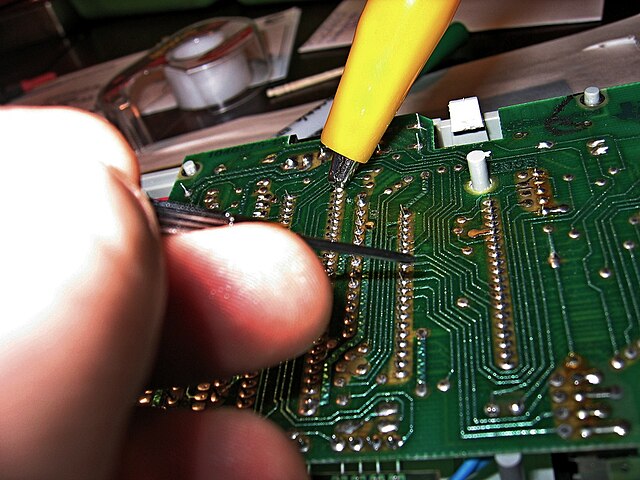Circuit bending
Modification of an electronic device to create an instrument From Wikipedia, the free encyclopedia
Circuit bending is the creative customization of the circuits within electronic devices such as children's toys and digital synthesizers to create new musical or visual instruments and sound generators. Circuit bending is manipulating a circuit to get an output that was not intended by the manufacturer.
This article possibly contains original research. (May 2008) |

Emphasizing spontaneity and randomness, the techniques of circuit bending have been commonly associated with noise music, though many more conventional contemporary musicians and musical groups have been known to experiment with "bent" instruments. Circuit bending usually involves dismantling the machine and adding components such as switches and potentiometers that alter the circuit.
Experimental process
This section needs additional citations for verification. (June 2019) |


The process of circuit bending involves experimenting with inexpensive second-hand electronics that produce sounds, such as toys, keyboards, drum machines, and electronic learning products.[1]

Innovators
While Ghazala says that he was not the first circuit bender, he coined the term Circuit Bending in 1992.[2]
Serge Tcherepnin, designer of the Serge modular synthesizers, discussed[3] his early experiments in the 1950s, with the transistor radio, in which he found sensitive circuit points in those simple electronic devices and brought them out to "body contacts" on the plastic chassis. Prior to Mark's and Reed's experiments other pioneers also explored the body-contact idea, one of the earliest being Thaddeus Cahill (1897) whose telharmonium, it is reported, was also touch-sensitive.
Since 1984, Swiss duo Voice Crack created music by manipulating common electronic devices in a practice they termed "cracked everyday electronics".[4]
See also

References
Further reading
External links
Wikiwand - on
Seamless Wikipedia browsing. On steroids.
